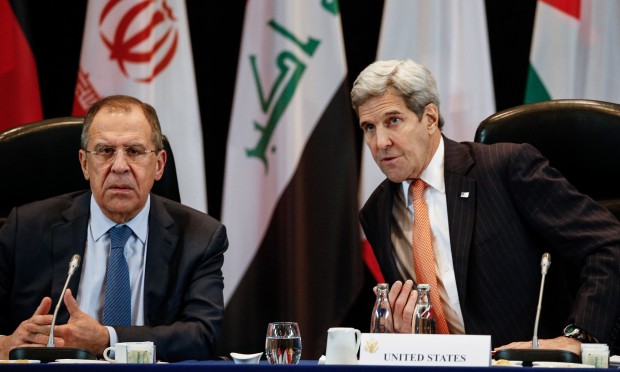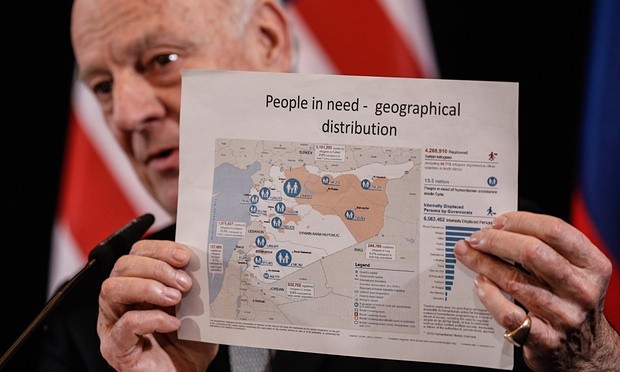Ceasefire in Syria agreed at Munich talks
US and Russia among powers to agree on cessation of hostilities ‘within a week’ and delivery of humanitarian aid – but no end in sight to Russian airstrikes

A cessation of hostilities is to come into force in Syria within a week and humanitarian aid is to be delivered to besieged areas across the country in the next few days, the US, Russia and other powers said late on Thursday night at talks in Munich. There was no clear commitment to end Russian airstrikes, however.
Galvanised by mounting international concern over the war, John Kerry, the US secretary of state, said progress had been made towards implementing a nationwide “cessation of hostilities”, although it was not clear how this could happen unless Russia stops bombing civilians and mainstream rebels who are fighting the Syrian president, Bashar al-Assad. Action against Islamic State would continue.
Western diplomats confirmed that there had been no agreement by Moscow to immediately end airstrikes – a key demand of the Syrian opposition, who are likely to be highly sceptical about the results of the talks.
Kerry said a UN taskforce would “work to develop the modalities for a long term and durable cessation of violence”.
Speaking after lengthy talks that included Russia and more than a dozen other countries, Kerry said that all involved agreed that Syrian peace negotiations should resume in Geneva as soon as possible.
Kerry, flanked by the Russian foreign minister, Sergei Lavrov, and UN envoy Staffan de Mistura, acknowledged that the Munich meeting produced commitments on paper only. He and Lavrov agreed that the “real test” would be whether all parties to the Syrian conflict honoured those commitments.
Germany’s foreign minister, Frank-Walter Steinmeier, said: “We will only be able to see whether this was a breakthrough in a few days.”
Kerry told reporters the ceasefire would not apply to extremist groups including Isis and the al-Nusra Front. He said: “We are doing everything in our power diplomatically to bring an end to this conflict. This is still a complicated conflict, with increasing levels of violence and increasing levels of terrorists.”
Al-Nusra is part of the Jaysh al-Fateh alliance that conquered large swathes of Idlib province in the north in the spring of last year, and remains one of the most powerful groups in Syria fighting the Assad regime. It operates across Syria, including in Aleppo and Latakia provinces, Idlib, Hama and the south not far from the Jordanian and Israeli borders.
Syria’s main opposition group welcomed the plan, spokesman Salim al-Muslat told reporters. He cautioned, however, that the agreement must show effects before his group would join political talks with government representatives in Switzerland.
“If we see action and implementation, we will see you very soon in Geneva,” he said.
Aid deliveries are to begin by air to Deir ez-Zor and simultaneously to other besieged areas, including Madaya, Mouadhimiyeh and Kafr Batna. “Humanitarian access to these most urgent areas will be a first step toward full, sustained, and unimpeded access throughout the country,” said the statement issued by the International Syria Support Group (ISSG).
“The cessation of hostilities will commence in one week, after confirmation by the Syrian government and opposition, following appropriate consultations in Syria. During that week, the ISSG taskforce will develop modalities for the cessation of hostilities.”
Zeid Ra’ad al Hussein, the UN’s High Commissioner for Human Rights, underlined the urgency of the need for humanitarian access to besieged areas. He described the situation in Aleppo as “grotesque” amid the ongoing fighting that has sent tens of thousands of refugees to the Turkish border.
“The warring parties in Syria are constantly sinking to new depths, without apparently caring in the slightest about the death and destruction they are wreaking across the country,” he said in a statement.
“Women and children, the elderly, the wounded and sick, the people with disabilities are being used as bargaining chips and cannon fodder day after day, week after week, month after month. It is a grotesque situation.”
The British foreign secretary, Philip Hammond, said the agreement to begin a ceasefire in Syria within a week was an “important step” to ending the civil war in the country, but warned it would succeed only if Russia ceased bombing moderate opposition groups.

Hammond said: “If implemented fully and properly by every ISSG member, this will be an important step towards relieving the killing and suffering in Syria. But it will only succeed if there is a major change of behaviour by the Syrian regime and its supporters.
“Russia, in particular, claims to be attacking terrorist groups and yet consistently bombs non-extremist groups including civilians. If this agreement is to work, this bombing will have to stop: no cessation of hostilities will last if moderate opposition groups continue to be targeted.”
As the Munich talks got under way, the gravity of the five-year Syrian crisis was underlined by remarks by the Russian prime minister, Dimitry Medvedev, who was quoted telling Germany’s Handelsblatt daily: “The Americans and our Arab partners must think hard about this – do they want a permanent war? All sides must be forced to the negotiating table instead of sparking a new world war.”
Medvedev was apparently responding to suggestions that Saudi Arabia and other Gulf states might join the US-led campaign against Isis in Syria.
However, the US accused Russia of worsening the brutal conflict with its military action in support of Assad.
“It has been Russian support for the Assad regime over the past months, and most recently in the siege on Aleppo, that has exacerbated, intensified the conflict,” state department deputy spokesman Mark Toner told reporters. In response to a question about Medvedev’s “world war” warning, Toner said: “If that is Russia’s concern, then they should look at what they’re doing to support the Assad regime.”
Earlier, the US defence secretary, Ashton Carter, tentatively welcomed the prospect of ground troops from Saudi Arabia, though in a modest role providing special forces or helping to train local forces, rather than the full-scale Islamic coalition to fight Isis, previously hinted at by Riyadh.
The 17-member ISSG comprises supporters and opponents of Assad. Diplomats said discussions focused on a plan for halting fighting across Syria, though that fell short of a formal ceasefire, which, crucially, would require monitoring and verification. It was unclear how long any cessation might last.
Hours before the agreement was announced in Munich, veteran Syria watchers expressed scepticism over whether a genuine breakthrough would be achieved or, if claimed, whether it would actually be implemented.
“The key question is whether the [Assad] regime will deliver land access to besieged areas,” said one diplomat.
“That remains in the regime’s, not Russian, hands. The proof will be in the doing. If the Russians stop blowing up civilians and we see movement on access it might open the way to a resumption of the talks in Geneva – on a comprehensive ceasefire and and a political transition in parallel. But the regime will likely make positive noises and then stop anything happening. The problem is that a Kerry-Lavrov agreement doesn’t involve any of the actors on the ground. We need the Syrians on board.”
How to submit an Op-Ed: Libyan Express accepts opinion articles on a wide range of topics. Submissions may be sent to oped@libyanexpress.com. Please include ‘Op-Ed’ in the subject line.
- Libya needs to double POS terminals despite digital boom - January 13, 2025
- UN sets out new committee plan for Libya electoral path - January 13, 2025
- Tunisia’s Job Market: 22% AI Shift by 2025 - January 13, 2025


